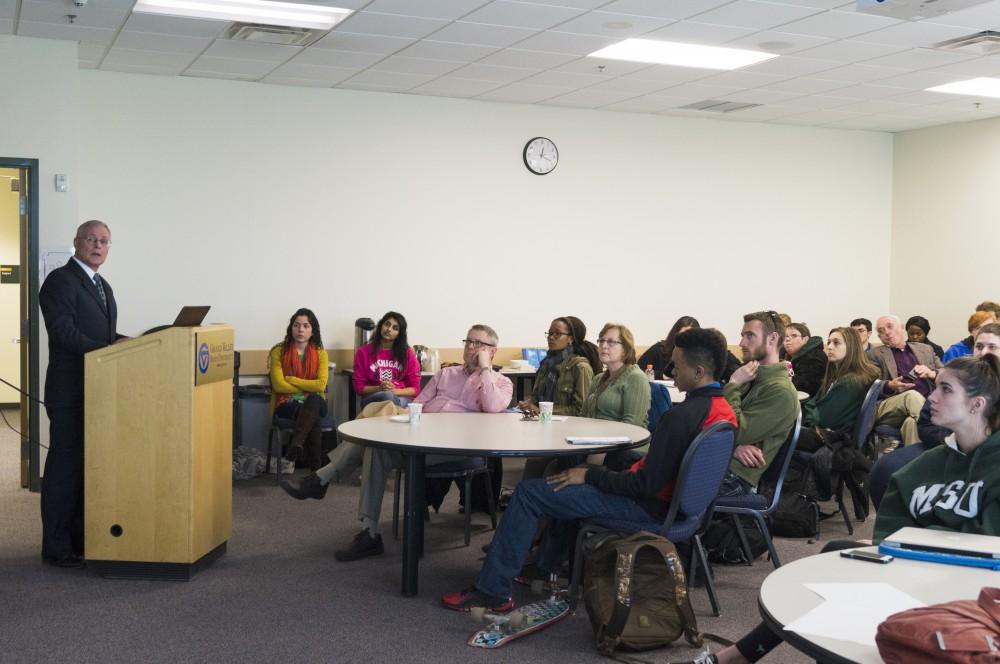Speaker sheds light on Christian, Islamic beliefs

GVL/Lauren Loria Dr. Stirling speaks about the similarities and differences between Islam and Christianity
Mar 18, 2015
As part of Islamic Awareness Week, Mack C. Stirling gave a talk on the parallels between Islam and Christianity to a full crowd of students and professors on Tuesday, March 17 from noon to 1 p.m. in the Kirkhof Center.
During his presentation, Stirling spoke about the Christian idea of God versus the Islamic idea of God and Jesus, and the fundamental problem in Christianity versus the fundamental problem of Islam. The fundamental problem of Christianity, he said, is sin, which is overcome by Christ. He then said the fundamental problem of Islam is forgetting that only God is absolute and real, and this can be overcome by submission to God.
He then went on to explain to the crowd that Muslims see their path to God through the Five Pillars of Islam.
“The first pillar is confession, which is, ‘There’s no god but God and Muhammad is His prophet,'” Stirling said. “The second pillar is five daily prayers, which are preceded by ritual absolutions. The third pillar is fasting from sunrise to sunset during the month of Ramadan. The forth pillar is giving alms for the poor, and the last pillar is making a pilgrimage to Mecca.”
In the second part of his lecture, he gave background information on Muhammad and the Muslim’s view of him as the “last and greatest of the prophets,” as well as how, in Muslim belief, the Quran is the “pure word of God in the sacred language of Arabic – which is human language transformed by the divine.”
Despite having differences, Stirling said Christians and Muslims should still love each other.
“Christians cannot accept the Muslim view of Christ or Muhammad as an infallible prophet, and Muslims cannot accept the Christian view of God and the incarnation,” Stirling said. “Christians should love and respect Muslims just as the Quran commands Muslims to love and respect Christians.”
In the last part of his lecture, he spoke on the history of the relationship between Muslims and Christians, as well as the relationship the two religions have today.
“In history, both Muslims and Christians have often subordinated religion to personal gain,” he said. “The majority of Muslims want both democracy and religious freedom. The West has lectured the Muslim world on human rights, but then they’ve done things like water boarding, Guantanamo Bay and the theft of the Palestinian land.
“The West has also lectured the Muslim world on democracy, but then have propped up anti-democratic dictators. The majority of Muslim’s prize Western freedoms but are dismayed by perceived moral decay.”
Additionally, he said there are a lot of things American Christians don’t hear about Islamic faith, and there are a lot of things he is worried about in today’s world.
“The vast majority of Muslims are opposed to terrorist acts,” Stirling said. “Multiple Muslim clerics and Imams from all over the globe have persistently denounced Muslim acts of terror, and the Quran only permits defensive war and gives guidelines to protect enemy non-combatants.
“There are some worrisome features of the world today, such as increasing terror acts by Muslims in the West, radical Muslim clerics in the West that are actively recruiting youth to violence, large scale terror attacks in the Muslim world (by ISIS and Boko Haram), increasing Shia and Sunni tensions leading to ethnic cleansing and increasing anti-Muslim sentiment in the West.”
To end his lecture, he said the best basis for common ground between Christians and Muslims are the commandments found in each. He also said he believes Christians and Muslims believe in the same God, but that they just understand him differently.
“So let us keep the essential commandments of loving God and our neighbors, and let us follow the challenges of the Quran to compete with one another only in doing good works,” Stirling said.
Stirling is a graduate of the John Hopkins University School of Medicine and, in 1987, he accepted a position as assistant professor of cardiothoracic surgery at the University of Michigan. In 1990, he initiated the cardiac surgery program at Munson Medical Center. As for his religious credentials, his family was active in The Church of Jesus Christ of Latter-day Saints (LDS). He served a mission for the LDS church in Norway from 1971-1973. Since then, he has been a very active teacher in the Mormon Church and has authored many publications in religious books and journals.
This talk was one of many that will be held during Islamic Awareness Week. On Wednesday from 6 p.m. to 7 p.m., Noor Tagouri will give a talk titled “Muslims, Media and Misconceptions” in the Multipurpose Room in Kirkhof.
On Thursday, it’s “Wear A Hijab Day with the MSA” from 6 p.m. to 7:30 p.m. in the Multipurpose Room. On Friday from noon to 1p.m. in Au Sable Hall Room 1302, professor Gamal Gassim will give a speech called “Regional and International Context for the Rise of Extremism in the Middle East.”
All of the events are LIB 100 and LIB 201 approved and food and drink will be provided.

























